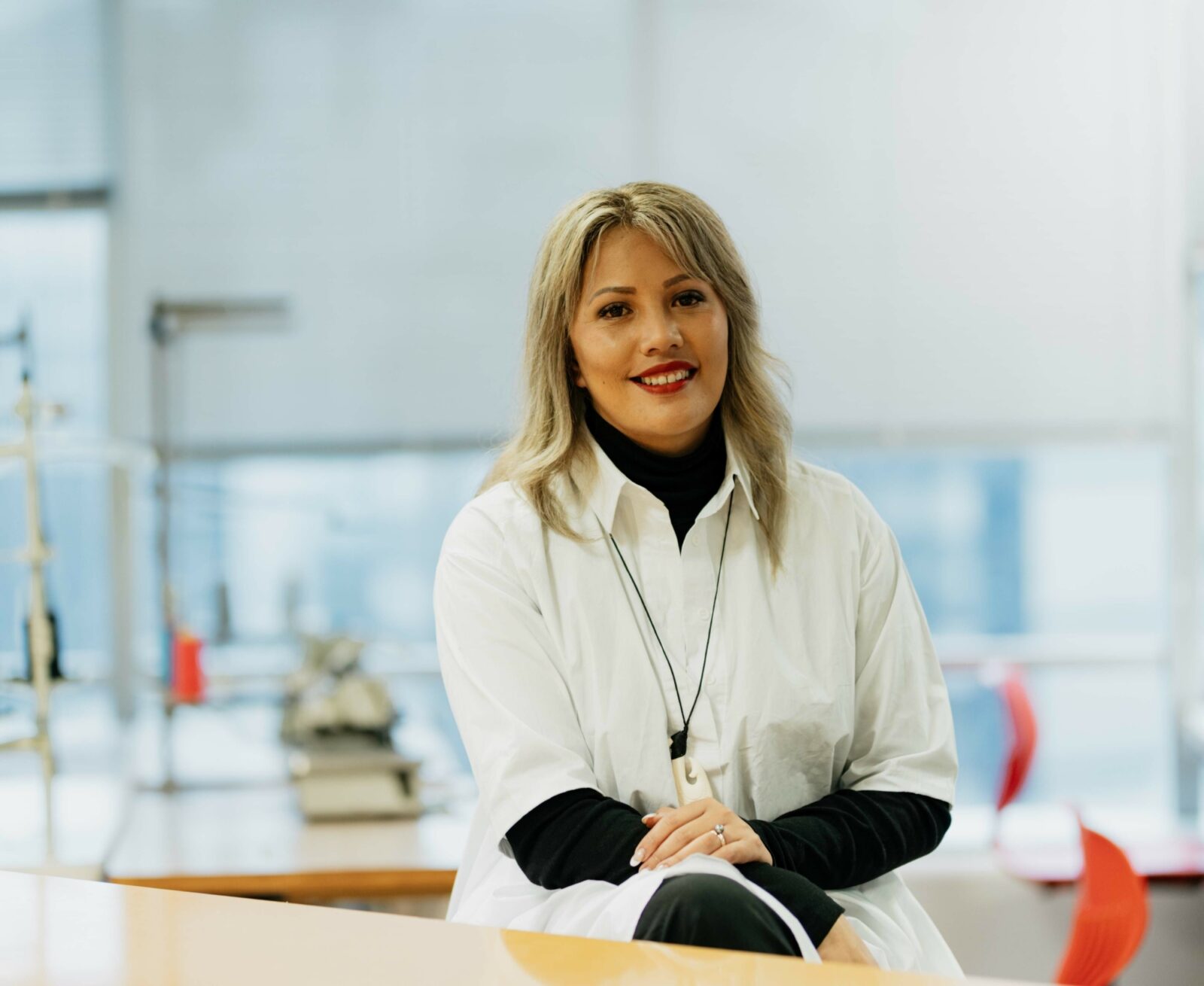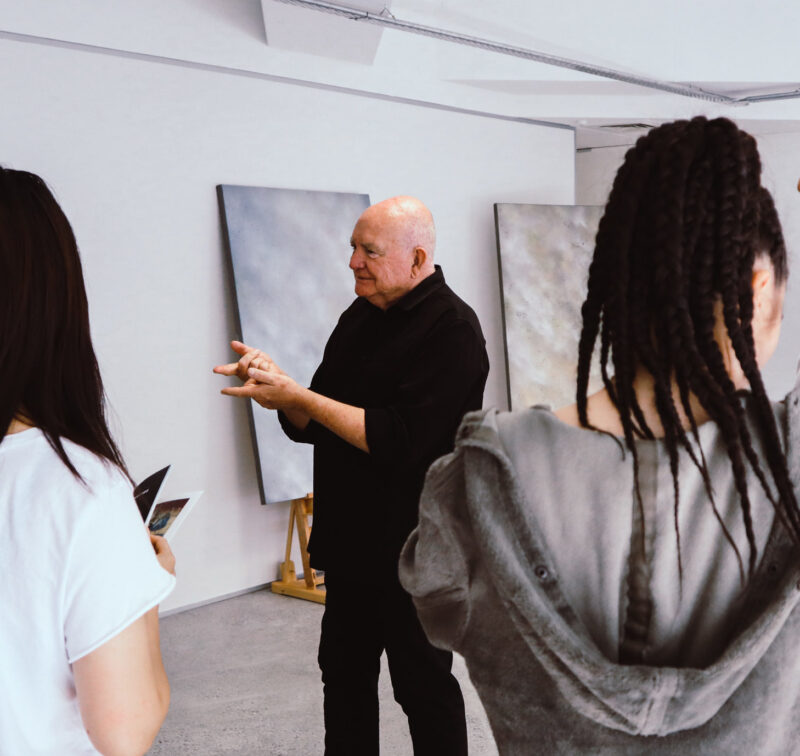Alumni Spotlight: Hiria Aorangi
We sat down with fashion designer and Fashion Tech alumni Hiria Aorangi, and talked about her experience as a Vogue-featured fashion designer.

Do you have any advice for upcoming designers wanting to create their own brand?
My advice for up-and-coming designers wanting to create their own brand, or launch their label or anything like that…
I feel like in the four years up until today, it's been testing the market. I have a garment, I have a korowai and that's what I'm wanting to share with everybody. [It’s understanding] how are people reacting to that and then, how can you stay true to what you actually want to design. The korowai, it's more representative of culture than anything. The silhouette is what it is, and so now I actually get to really start pushing in my visual side and actually changing it into the direction that I would like for it to be seen. I want somebody to see my designs and go “oh, that's one of Hiria's” and it's recognisable through that.
Currently we've been going through the motions of; putting yourself in front of the audience that you want to, but, then also taking them on the journey. So that when you actually start designing your own collections, year after year, or season after season… you're starting to really focus in. [Focus in] on the things that, not only do they love about what you do, but, pushing your design aesthetic through further and further as you go along the journey.
Know what you want. What the garment is, or what your look is, or what your kaupapa is. Whether it's about sustainability or anything like that. I have to know where everything is coming from, that's just the way that it is for me. If it's your brand, what do you care about? Make sure that you're the person putting all of those steps in place because it wouldn't be your brand without all of those tiny little things.
Get comfortable. Know who it is that you're trying to help. Who you're trying to connect with and why. Not just on a garment level, but if you're going to have a team around you, what are the values that you want everyone to operate on? Make sure that they're on board with that, so when they're coming in and they're contributing, they love it. They love it as much as you do. “I love it, I want people to love it”. All of those things about your brand and about your label, even in-house. How that overflows out to the community that you want to share your garments with, I think is really more important than just the production of the garments each time.
Do you have any advice for connecting with potential clients?
I think that might be case by case. Why I say that is I've learnt certain things, more so about myself, through the journey. [The] self-development of this brand and understanding “what's my message?” behind my korowai design.
I've learned that I'm introverted, but I'm also very assertive. So, if you're able to look at who you want to connect with, and why, it might become quite natural. Otherwise, you'll just have to do it. There's going to be a reason why you need to connect with that certain person for a certain project. It might just happen quite naturally. Where you both walk into the same room for something and then you just hit it off. Don't ever force anything and don't ever feel rejected in any way. If [there is] somebody that you looked up to or thought that you wanted to work with it and it doesn't work. Again, timing [needs to be] just perfect. Maybe they're in a space that they're focusing on a project and it didn't hit off in that first time because eventually if it's supposed to happen, it'll happen.
What inspired your brand and where do you see it going?
My last daughter, I started [her] weaving. Which was how getting into korowai was kind of ignited. Then because I had this background, I was able to add the contemporary style. My thing was about empowering children to have a chance to stand in their mana. I saw that when we moved back from Melbourne, [with] te reo Māori things had changed from when I was here. We lived in Australia for seven years, came back and even I noticed the change. I was like “oh, this is pretty cool” so I decided to start weaving and learning about the actual hand crafting of it. Started a Facebook page, started sharing what my weaving. Then started being asked to do the contemporary versions for friends family and things like that.
The development was natural, it wasn't the plan to be here. The purpose of creating korowai and creating kākahu [is] for everyone to stand in their mana on their day; whether it be graduating, whether it be a wedding. Making that accessible but also, still, from a Māori designer from here in Aotearoa. That's what makes us so unique. There could be Māori designers not in New Zealand… it's not to say you can't get it from them; but my uniqueness is I'm a Māori designer on the whenua and I get to create my designs. We graduated to our classic designs which was based around what people knew currently about what it looks like. We were giving them what they already knew to be familiar, in order for us to solidify ourselves in that area. The blues represent Tangaroa so everything came from Māori atua, or legends, or gods and things like that. They all have a place that's come from [that] inspiration but we're going into Nouveau, which are our high fashion things because we've had the chance (and we're going to always have the chance) to share on Vogue and Vanity Fair and a few other magazines to be released.
I love to dress up. I don't know if that's part of my Māori identity. Ngāti Hine, we love to dress up. I thought “oh, well what about red carpet”, because I've come from a fashion background. “What about this occasion, what about that occasion, what about somebody wearing it as a performance piece, at a concert? Where are those korowai? Where are those kākahu?”, because we have so many different personalities. That's why we started heading into this Nouveau design. Our third collection, which is yet to be released, but I'm happy to share with you guys… is more reflective of 1840. It's a very natural aesthetic and we'll be mixing mediums of hand woven and also harakeke with contemporary methods.
What does create meaningful change mean to you?
That's what korowai is, you know. Every korowai that I create, every kākahu that I create, I hope and I believe and I dream that that's going to make an impact. I don't need to sell a million. Even in my mind, I think, one per every whanāu that wants one. Also the education around… “What is korowaitanga, what does it really mean? What's all the tikanga around it?” Sharing the education and the awareness around this garment and creating change. Not just creating for the sake of creation. Putting [out] things that really sometimes don't need to be. Sometimes I get quite like “that's too much”. You know, that fast fashion thing, it really hurts to see that happening and it's nice that people are practicing restraint. If you're going to create something; what are you creating and what is the impact that you are creating for? Whether that be through a garment or through the words that you're speaking and things like that. Every korowai or every kākahu that I design… I believe the family, the one family that needs it; that will be passed down from generation to generation. I haven't filled the world with too many. I’ve just given it to the families that feel that they're ready for it and would love to have that taonga or that heirloom. That gets passed down, so I know that there's going to be a point where that's enough and hopefully I’ve shared the kaupapa around korowaitanga.
Talk to our team

If you would like to ask us a question or request more information, please detail your enquiry using the form below. If you would like you can contact us directly on 0800 800 300, email us or use the contact us form.